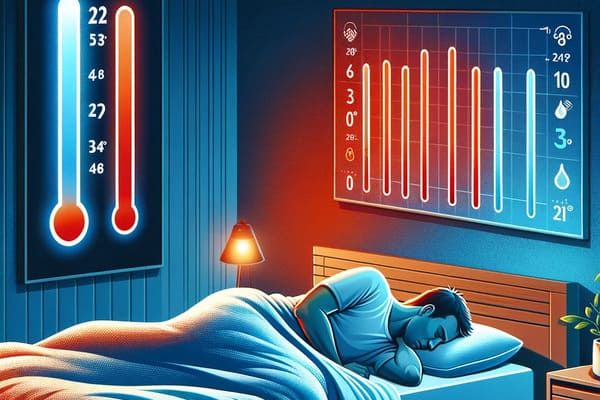Ever find yourself kicking off the covers one minute, then pulling them back up the next? Maybe you’ve spent restless nights in the summer heat, or shivered through winter trying to get comfy. Sleep is super important. It helps your body and mind recharge. Did you know that temperature plays a big part in how well you sleep? Both the temperature in your room and how your body regulates its own temperature can make or break a good night’s rest. Let’s see how temperature affects sleep:

The Science of Sleep and Body Temperature
Your body is like a clock. It runs on a schedule called the circadian rhythm. This rhythm affects when you feel sleepy or awake.
The Circadian Rhythm’s Role
Think of your circadian rhythm as your body’s internal clock. It controls many things, like when you feel hungry, and when you get tired. It mostly responds to light and darkness. When it gets dark, your body starts to make melatonin, a hormone that makes you sleepy. This rhythm sets your sleep-wake cycles.
Core Body Temperature Fluctuations
Your body temperature isn’t constant all day. It actually changes to help you sleep. Before you go to bed, your core body temperature starts to drop. This cooling down signals to your body that it’s time for sleep. When you sleep, your body temp stays lower, and then it begins to rise again as morning approaches.

Ideal Room Temperature for Optimal Sleep
What’s the best temperature for snoozing? There’s a sweet spot.
The Sweet Spot: 60-67°F (15-19°C)
Experts say the best temperature range for sleep is between 60 and 67 degrees Fahrenheit (15-19°C). Why this range? It helps your body cool down properly, so you can fall asleep faster and sleep deeper.
Why Cooler is Better (Generally)
A slightly cooler room is usually better for sleep. When you sleep, your metabolism slows down. This means your body doesn’t need as much energy and generates less heat. A cooler environment helps your body maintain that lower temperature, promoting better sleep.
The Impact of Excessive Heat on Sleep
Sleeping in a hot room is not fun. It can mess up your sleep in many ways.
Fragmented Sleep and Wakefulness
Ever wake up sweating in the middle of the night? High temperatures can disrupt your sleep cycles. You might wake up more often and have trouble falling back asleep. This fragmented sleep leaves you feeling tired the next day.
Increased Heart Rate and Sweating
When it’s hot, your body tries to cool itself down. This can lead to increased heart rate and sweating. These physiological responses can prevent you from entering the deeper, more restful stages of sleep.
Real-world Example: Heat waves and sleep disturbances
During heat waves, many people find it harder to sleep. Studies have shown that sleep disturbances increase during these periods of extreme heat. It’s not just uncomfortable. It can affect your overall health.

Dangers of Sleeping in a Cold Room
Being too cold isn’t great for sleep either.
Muscle Tension and Shivering
When you’re cold, your body tenses up. You might shiver to generate heat. This muscle tension and shivering can make it hard to relax and fall asleep.
Increased Energy Expenditure
Your body works hard to stay warm when it’s cold. It burns more energy to maintain its core temperature. This extra effort can reduce the quality of your sleep, leaving you feeling tired and unrested.
Respiratory Issues
Cold, dry air can irritate your airways. This can worsen respiratory problems like asthma or allergies. These issues can make it difficult to breathe comfortably, disrupting your sleep.
Practical Tips for Optimizing Sleep Temperature
Okay, how do you make your bedroom a sleep sanctuary?
Adjusting Your Thermostat
Set your thermostat to the ideal temperature range before bed. In the summer, this might mean turning on the AC. In the winter, you could lower the heat a bit. Experiment to find what works for you.
Choosing the Right Bedding
Your bedding matters. Choose breathable materials like cotton or linen. These fabrics help wick away moisture and keep you cool. Avoid heavy, synthetic materials that trap heat.
Layering Clothing and Blankets
Layering is key. Wear lightweight pajamas and use layers of blankets. That way, you can easily adjust to temperature changes during the night. Kick off a blanket if you get too hot, or add one if you’re chilly.
Using Fans or Air Conditioners
Fans can help circulate air and keep you cool. Air conditioners are great for hot nights, but be careful not to set them too low. Direct drafts can cause discomfort.
Pre-Sleep Rituals: Warm Bath or Shower
A warm bath or shower before bed can actually help you cool down. The warm water raises your body temperature, and when you get out, the rapid cooling helps you relax and feel sleepy.
It is True that Temperature Affects Sleep
Temperature is a big deal when it comes to sleep. Staying within that 60-67°F (15-19°C) sweet spot can significantly improve your sleep quality. Try out these tips to find the perfect temperature for your bedroom. Experiment with bedding, clothing, and thermostat settings to see what works best for you. A good night’s sleep is waiting!




